“International Institutions Are Surprisingly Robust”: The Case for Sticking with Multilateralism

Major powers are increasingly approaching global problems through a zero-sum lens. Is multilateralism on its last leg? In his inaugural lecture as Professor of International Security and Cooperation at Maastricht University, ENSURED Project Coordinator Prof. Dr. Hylke Dijkstra will argue that it is not. Here’s a preview.
How should international cooperation be organised in an age of geopolitical upheaval?
Many observers agree that geopolitics is back. Russia’s war of aggression against Ukraine and the implications of a rising China are obvious examples, but so is the ongoing instability on the African continent, which has seen seven coups over the last three years.
Geopolitics is traditionally about conquest, territory, and spheres of influence, but its forces are clearly also felt across global governance forums, where powerful rivals meet and fight over international rules or distributive questions. Indeed, the shadow of geopolitics looms large over the theaters of international cooperation, even in policy domains that were previously not considered ‘geopolitical’ – such as climate action, digitalisation, and global health.
The return of geopolitics also means that major powers increasingly approach urgent international problems through a zero-sum lens. Many multilateral institutions appear gridlocked as rivaling states block proceedings and fail to comply with established norms and rules.
To my mind, the primary challenge therefore is to make existing forms of international cooperation more robust so they can better withstand geopolitical pressures. Multilateralism remains a unique form of cooperation that is worth defending.
Is multilateralism still fit for purpose?
In the 21st century, existing multilateral institutions may no longer be entirely adequate and up to their tasks, but multilateralism as an approach strikes me as very important in an era of geopolitics.
In my inaugural lecture, I will thus make the case for sticking with multilateralism. Among the different forms of international cooperation, multilateralism stands out as unique because it is marked by diffuse reciprocity, generalised principles, non-discrimination, and an emphasis on expert-informed policy. Multilateralism is not about quid-pro-quo-style deals or shortcuts but rather fundamentally about addressing international problems.
Based on previous research, I will also argue that multilateral institutions are surprisingly robust and actually well-equipped for an era of geopolitical tension. For instance, in my research project “NestIOr,” my team and I have shown that of the 500+ multilateral institutions that have existed since 1815, those with a larger number of staff members survive longer. We have equally shown that dedicated leadership, clear organisational structures, and an embeddedness in societal networks all help international organisations respond to existential challenges. In other words, cooperation that is organised through multilateral institutions is actually rather robust.
There is thus something unique about multilateralism, which allows countries that normally do no see eye to eye to join forces and to achieve gains from cooperating with one another. Our multilateral institutions were designed in the 20th century and may need some tweaking to make them ready for this century – but the multilateral method itself is worth keeping.
Why should the EU strive to be at the forefront of defending multilateralism – and how can it get there?
For some time now, we have known that multilateralism is in crisis and that the forces of geopolitics, along with domestic populism in many countries, put considerable pressure on international cooperation. Scholars have studied those causes in-depth. However, we are still struggling to come up with practical answers to this crisis of multilateralism.
This is particularly worrying for us here in Europe, as Europe and the EU are intimately connected to multilateralism and a rules-based global order. Indeed, the EU itself is a prime example of multilateral cooperation. It would be wishful thinking to assume that the EU can survive if the rest of the multilateral system collapses.
In my inaugural lecture, I will provide some initial ideas for solutions. With much at stake, I argue that Europe should reinvest in multilateralism, even if this requires patience and compromise, increased funding, and dedicated leadership. But we also need more research about how the EU can achieve this. The real insights on that front will have to come from our ENSURED project over the next couple of years.
I am thrilled to be working with a team of 14 partners and more than 35 researchers within ENSURED to try to answer this practical question and provide European policymakers with new knowledge and best practices to help them transform global governance.
This first appeared on the ENSURED website.
Photo: Richard Koek / Dutch Foreign Ministry via Flickr (CC BY-SA 2.0)


